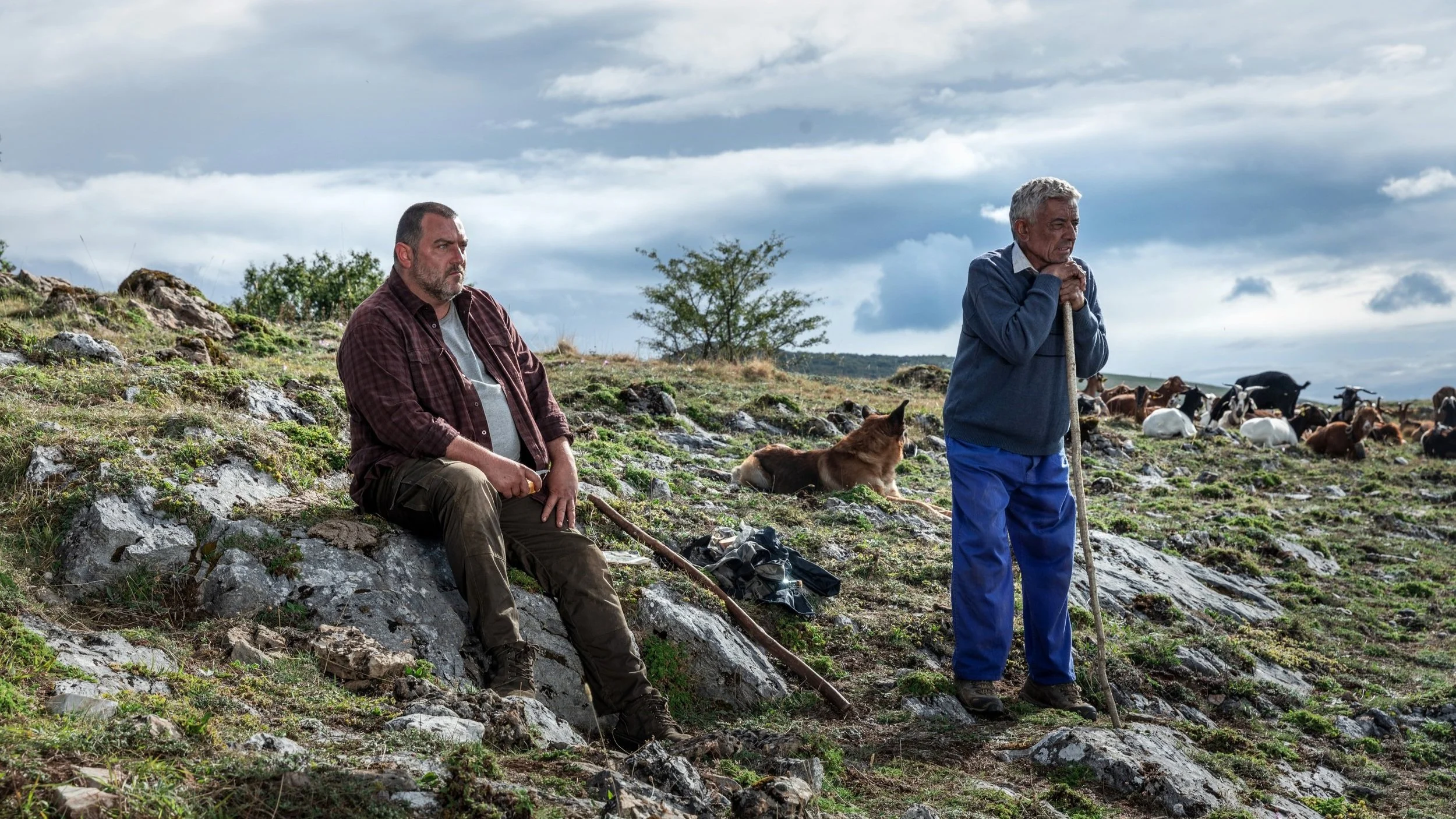The Beasts
Rodrigo Sorogoyen’s compelling drama set in rural Spain contains a great perfomance by Denis Ménochet.
To find an example of perfect casting you need look no further than this Spanish/French co-production directed by Rodrigo Sorogoyen. Recently Denis Ménochet impressively conjured up the ghost of Rainer Werner Fassbinder in François Ozon’s Peter von Kant, but the role which he seems to have been born to play is that of Antoine Denis the French farmer in The Beasts who, accompanied by his wife Olga (Marina Foïs), has opted to settle in rural Galicia. It is a part of Spain where the locals are stubbornly nationalistic to the extent of still ranting on about how Napoleon dared to invade the region in 1808, that being a very clear indication of just how hostile many of them are to the French couple who have now been around for a couple of years.
That Antoine belongs to the minority in the village who are opposed to selling off the land for a wind farm development (a scheme which those most embittered by their impoverished lives see as providing money to move away) adds to the verbal abuse at his expense building up and turning into menacing actions. Those responsible for it hope to make Antoine withdraw his refusal and to accept the scheme or, better yet, to drive him and Olga out. He does have one elderly supporter who shares his views, Breixo (Gonzalo García), and one neighbour who is friendly (José Manuel Fernández), but his chief opponents, the Anta brothers Xan (Luis Zahera) and Lorenzo (Diego Anido), become increasingly dangerous.
The Beasts traces the way in which the threats to Antoine grow and then follows through to reveal the eventual outcome. Such a story could have been treated as a drama akin to those tales of innocents being subjected to increasingly violent behaviour that ultimately lead to a big climax in which what happens is not far removed from the horror genre. But, despite containing some highly skilled scenes that are full of tension, Sorogoyen's film is not like that at all. One reason for this is the way in which it uses a running time of 137 minutes to make the characters become wholly real to us so that what happens to Antoine and Olga really does concern us. That is no less so because the screenplay allows us to understand the frustration that leads the older residents to see the proposed development as their only opportunity to start a better life.
Given the intention to involve us so closely with the characters, the pacing of The Beasts is admirably judged and its sense of realism extends to making all of the characters credible (despite their dreadful behaviour the Anta brothers never become mere villainous stereotypes). Zahera and Anido both play with skill and Marina Foïs, whose role as Olga becomes more central as the film proceeds, is very well cast. But it is Ménochet whose performance is pivotal. A big man, he fully inhabits the role of Antoine making us aware of his underlying immovability (in some respects he is as bloody-minded as the Anta brothers) yet enabling us to feel sympathy for him even if he clearly dominates the home for all that he is devoted to Olga.
Add the appeal of the widescreen photography by Alex de Pablo and it is easy to assume that The Beasts could come close to being a masterpiece. Although the screenplay written by Isabel Peña and the director is so well tailored to create a work that is more than just an adroit entertaining thriller, Sorogoyen’s direction does yield a couple of sequences that convey tension in a manner worthy of Hitchcock. The first of these is a night scene during which Antoine and Olga returning home by car find the road blocked by the brothers who are armed and the second is a daytime episode in which Antoine suddenly finds himself cornered. It is part of Sarogoyen’s mastery that, while the film’s music score is used to hint at violence ahead, both of these key sequences play out without music and are all the stronger for it.
The Beasts is a film not to be missed, but I did ultimately conclude that it was less than the masterpiece that it seemed set to become. It is largely a matter of the second half being less convincing than the first in the way that the characters behave. This applies particularly to Marie (Marie Colomb), the daughter of Antoine and Olga, who appears relatively late on and whose attitude changes in ways that feel unconvincing (it’s just possible that a slightly longer running time would have been an advantage since it could have led to extra footage elaborating her responses). A further point which feels important is that, although the film indicates early on that Olga has reservations about how Antoine is handling the situation, the concluding scenes only hint vaguely at how different her own approach would have been. It matters because you feel that this issue is a key point that the film is trying to make but that it falls short here. Never mind though. Even if The Beasts has its imperfections, Ménochet’s performance has none and the film contains much that is deeply impressive.
Original title: As bestas.
MANSEL STIMPSON
Cast: Marina Foïs, Denis Ménochet, Luis Zahera, Diego Anido, Marie Colomb, Luisa Merelas, José Manuel Fernández, Machi Salgado, Gonzalo García, Xavier Estévez, Melchor López, Luis P. Martinez.
Dir Rodrigo Sorogoyen, Pro Ibón Cormenzana, Ignasi Estapé, Sandra Tapia Diaz, Rodrigo Sorogoyen and others, Screenplay Isabel Peña and Rodrigo Sorogoyen, Ph Alex de Pablo, Art Dir José Tirado, Ed Alberto del Campo, Music Olivier Arson, Costumes Paola Torres.
Arcadia Motion Pictures/Caballo Films/Cronos Entertainment/Le Pacte/Canal+/Ciné+-Curzon.
137 mins. Spain/France. 2022. UK Rel: 24 March 2023. Cert. 15.


